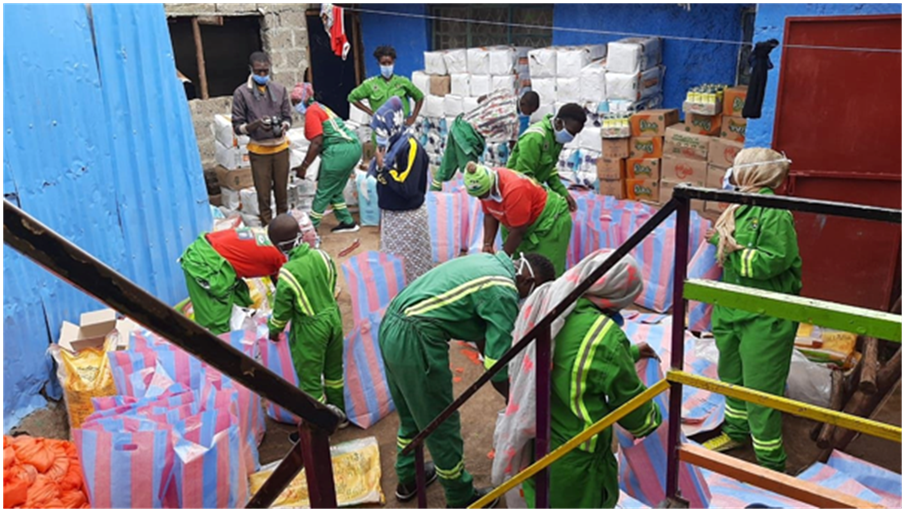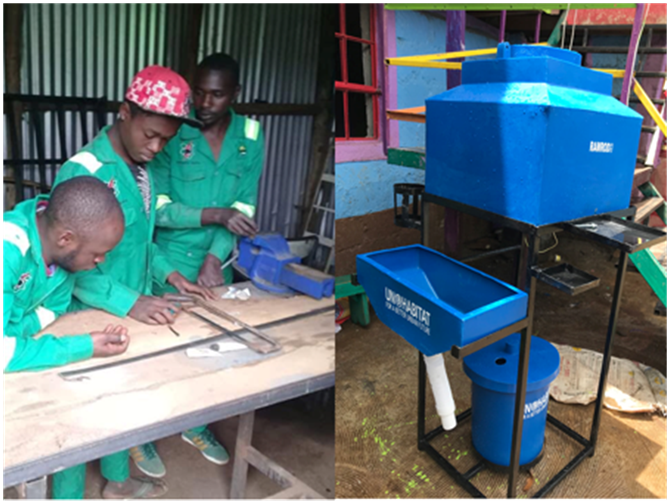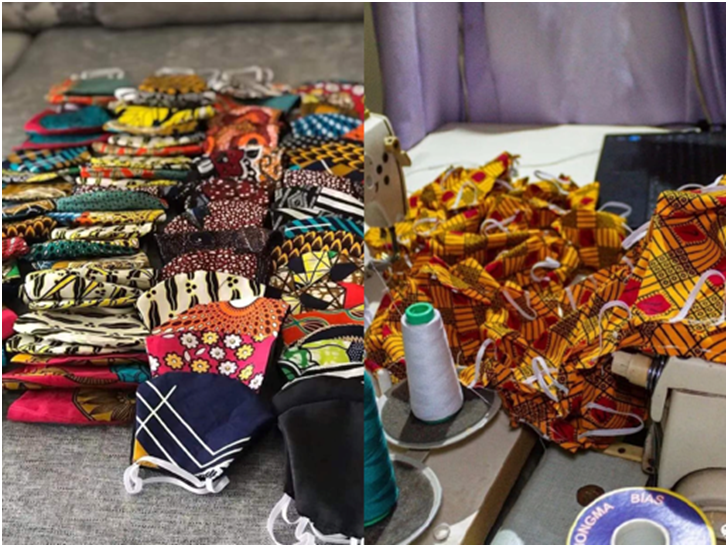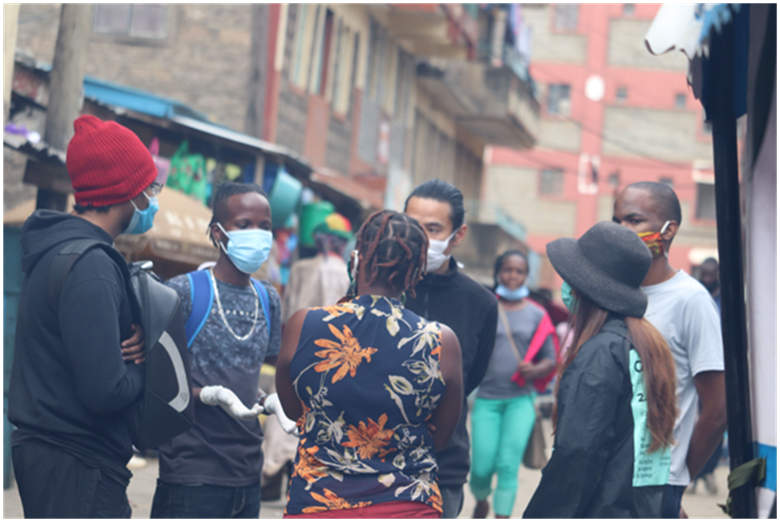As of the writing of this article there are more than 30,000 confirmed cases of COVID-19 in Kenya. A limited testing capacity means that the real number of cases is likely much higher. Due to measures such as the lockdown of certain regions and a dusk-to-dawn quarantine, many people have lost their jobs and cannot manage daily expenses. The Kenyan government estimates 770,000 have youth lost their jobs in the first 3 months of 2020 due to the virus. Kenya now faces a dual challenge of creating new employment opportunities to stabilize people’s incomes while also safeguarding their health.
In response to COVID-19, youth in slums and informal settlements have come together to create the Youth-led COVID-19 Emergency Response Coalition, comprised of 24 youth-led groups, to protect their local community from the pandemic. In addition to improving the health of the community, these young change-makers in Kenya have promoted employment and improved livelihoods. The Youth-led Emergency Response Coalition recognized at the outset of the pandemic the vulnerabilities of front-line workers, and thus ensured good conditions for employment opportunities created through their COVID-19 prevention projects.
The Coalition’s milestone of 1,500,000 hand washes was celebrated at the Youth, COVID-19 and Informal Settlement International Summit held on 12th August 2020 to learn from youth-led COVID-19 responses globally. The event was sponsored by the Government of Turkey, the Turkish Municipality of Balikesir, Habitat Norway and UN-Habitat. The Summit was endorsed by UN 75, the global dialogue launched by the UN to listen to people across the world, especially youth.
We would like to highlight some of the Coalition’s more innovative interventions here. Apart from the activities mentioned below, the Coalition works closely with local government to distribute emergency food rations to at-risk communities.

(Youth workers from Kibera Green are packing food packages for donation)
COVID-19 Prevention Stations
The best means of providing job opportunities were the hand-washing stations. The Coalition, oversees 74 Stations in the informal settlements and neighboring counties in Kenya. Hand-washing has been promoted by the World Health Organization as one of the most effective ways to fight COVID-19. However, many vulnerable groups do not have the extra money to pay for the soap and clean water needed to follow hand-washing.

(LEFT) Youth in Kibera are taking free occupational training. (RIGHT) The hand-washing machine designed by local youth)
Thus, youth representatives from Mathare slum, the second biggest slum in Nairobi, suggested building hand-washing sites at their youth centre the Mathare Environmental One Stop. The first two stations were put up by the One Stop on their own initiative, where within one month, they washed over 100,000 hands. Following this success, they reached out to other agencies, with UN-Habitat, the Canadian High Commission, Norwegian Embassy and Chandaria Foundation coming onboard.
Each station has 2 assistants working, from 6:00 am to 7:00 pm, who disseminate information on COVID-19 prevention and assist people in washing their hands properly. Each assistant receives 500 Shillings (5 USD) per day, and 2 masks and 1 pack of gloves for day-to-day protection. Building hand-washing sites in informal settlements has proven to be a very successful practice in fighting COVID-19. The influence of this project is expanding to other counties in Kenya, moving from Mathare and Kibera to Mandera, Nyeri and Eastleigh.
In addition to assistants, the production and design of the hand-washing stations also involves youth participants, such as electric welders who received occupational training before COVID-19 in Kibera. A qualified washing site is designed to be “touch-less” to prevent transmission, and also functions to store and save water. Boniface Ndegwa of the Good Guys and Gals association in Nyeri county and the host of 5 hand-washing stations, designed and built their own touch-less, foot pedal station which they use in Nyeri and are now selling elsewhere.
Producing Fabric Masks to Increase Women’s Incomes

(The fabric masks made by local women)
Women are more vulnerable than men to job losses as they do informal work such as washing clothes, cleaning offices, selling produce etc, all of which stopped during lockdown. They do this work in addition to their care work of looking after their family.
A recent study by the University of Washington forecasts that masks & social distancing in Africa could prevent up to 60,125 deaths.The Kenyan government had imposed strict fines for not wearing masks in public, yet masks remained expensive for those in informal settlements. The Coalition approached UN-Habitat and football star Victor Wanyama to support mask-making. On August 15, at the close of International Youth Week, a mask campaign was launched by the Kenyan Government. The masks are made by women’s collectives in the Mathare and Kibera slums, and distributed through the hand-washing stations by the youth. The mask-making efforts of women tailors have become essential in the fight against COVID-19, while also providing employment and income for women.
The Coalition is also committed to equal representation of women, through organizations such as Wonderful Mothers.
Sustaining Waste Management Projects
To secure more youth employment during this crisis, the Mathare Environmental Conservation Youth Group revamped their waste management project to continue providing employment to youth who collect waste from 2000 households. This was achieved through partnership with Plastik Rafiki, a student-led club based out of the International School of Kenya experienced in machine upgrade, product design and marketing, and the International Organization for Migration.

(UN-Habitat staff and students from Plastiki Rafiki project are visiting waste management project site in Mathare slum)
Plastik Rafiki and IOM will upgrade the plant machinery and provide training to youth personnel. In the long term, the equipment upgrade will vastly increase the unit’s capacity and profit, bringing in even more youth employment to the project. This will serve to protect the local community from employment shocks generated by the pandemic.
Conclusion
The Coalition is a “proof of concept” that youth can bring about significant positive social change in their communities. They have created new job opportunities in various COVID-19 response projects while at the same time protecting the health and well-being of their communities.
by Rodah Ingashani, Raphael Obonyo, Isaac Muasa, and Kui Cai.
This article is part of the Decent Jobs for Youth Blog Series: Youth Rights & Voices. The Blog Series highlights the impact of the COVID-19 pandemic on young women and men in the world of work and discusses action-oriented policy responses and solutions. If you would like to comment or contribute, please contact decentjobsforyouth@ilo.org.



